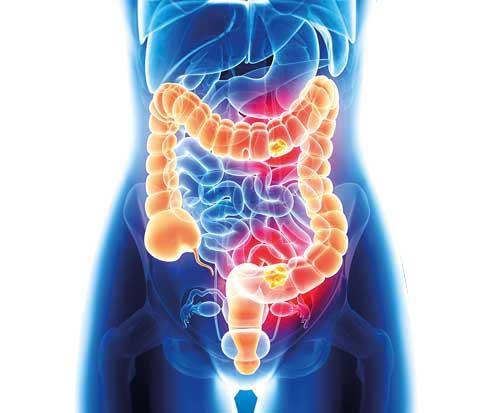13 Jan 2020 - {{hitsCtrl.values.hits}}
 Have you been experiencing a change in your normal bowel habits recently where there are days with diarrhea followed by constipation and vice versa without a regularity at all? Time to time variations of the bowel habits can be completely normal especially depending on your daily diet, but did you ever think that a persistent change in your bowel habits can be a sign of a serious problem in your digestive system? Unfortunately, yes.
Have you been experiencing a change in your normal bowel habits recently where there are days with diarrhea followed by constipation and vice versa without a regularity at all? Time to time variations of the bowel habits can be completely normal especially depending on your daily diet, but did you ever think that a persistent change in your bowel habits can be a sign of a serious problem in your digestive system? Unfortunately, yes.

Although we do not pay much attention to altered bowel habits, it is always better to seek medical advice as early as possible. Hence the Daily Mirror Health Capsule spoke to Dr. Chinthaka Wijesurendere, Hospital, MRCS, MD (Surgery), Consultant General Surgeon to discuss about some of these serious conditions with a special interest on colorectal surgery.
“Bowel movement should be an effortless routine. In fact, what is normal to one person may not be so to another. Generally, the frequency of bowel movement varies from three times a day to three times a week and there is no set pattern that is considered ideal” says Dr. Wijesurendere.
According to him, when bowel opening changes from what is usual to someone in its frequency (increased/reduced) or consistency (too loose/too hard), presence of blood or mucous (slimy like material) in their stools or pain in the abdomen etc. this could indicate a problem in your bowel. Any such change should be considered as abnormal and one must seek medical advice if it persists beyond several days.
Red flag signs that need immediate medical advice
Blood in stools that appears fresh (bright red) or slightly altered in colour (maroon or black).
“Look before you flush!” - Bright red bleeding usually originates from a problem in either the rectum or anus and altered blood arises higher up in the intestine.
A painful yet fruitless urge to pass stools (Tenesmus).
“If I explain it further, sometimes one can feel a strong painful urge to pass stools even when their rectum is empty. You may have to strain but in the end, there’s only passage of a small amount of stools or even blood” underscores Dr. Wijesurendere.
Unusual difficulty in emptying bowels for days that follows a spell of diarrhoea.
Unintentional loss of weight and loss of appetite with symptoms of low hemoglobin such as weakness and pale skin.
Altered bowel habits can be due to various pathologies and cancer is one
According to Dr. Wijesurendere, a change in bowel habit could be caused by many conditions, but the good news is many of these are not serious. However, unless one is checked thoroughly by a doctor, a serious problem such as cancer could go undetected until it advances. Below are some of the conditions that can change your bowel habits, briefly explained.
-Irritable bowel syndrome – A common condition that causes diarrhoea, constipation and gas bloating of the abdomen which can be long standing. It is a harmless condition where the bowel is entirely normal and symptoms can be controlled effectively having ruled out more serious causes.
-Ulcerative colitis – A condition caused by long standing inflammation of the colon that leads to blood and mucous diarrhoea. It is a form of what is known as ‘Inflammatory bowel disease’(IBD).
-Crohn’s disease – Another form of long standing IBD that can cause diarrhoea, weight loss, anaemia (low hemoglobin) and abdominal cramps.
-Diverticular disease – This condition mainly affects the left sided colon (large intestine) and it may cause pain in the left lower abdomen, diarrhoea and blood in stools.
-Infections – Viral and bacterial infections of the bowel can cause diarrhoea or even bloody stools, but they’re usually transient.
“Apart from these conditions of the bowel, thyroid hormone abnormalities and certain medications could cause a change in bowel habits,” said the doctor.
Piles and polyps
‘Piles’ is the common term given to the medical condition called haemorrhoids. These are swollen cushions of the inner wall of the anus that usually causes fresh bleeding, itching and a lump that pops out of the anus. These are usually painless, and it has no risk of becoming cancer. These, depending on their size could be treated with injection, application of rubber bands or surgery.
‘Polyps’ are lumps of varying sizes and shapes that originate in the bowel. Although, many of these are ‘non-cancerous’ there are certain types which could lead to cancer. So it is always better to seek advice from a surgeon in order to assess its cancer risk and should be dealt with accordingly. Also, there are instances where multiple polyps are seen in the bowel (Familial polyposis syndromes) where such patients run a significant risk of developing cancer of the bowel with a tendency to run in families,” Dr. Wijesurendere explained further.
Changes with age
“As we grow old, there is a tendency to get constipated more often. Apart from this, as advancing age is a risk factor for cancer, any change in bowel habit should be evaluated carefully to rule out cancer” explained Dr. Wijesurendere.
Immediate medical advice
“Any recent onset change in bowel habit must be communicated to your doctor if persistent more than several days. The signs that I have mentioned under the red flags must be checked by a doctor without a delay. In Sri Lanka, you could see your general practitioner or a general surgeon who should be your first contact to evaluate the problem,” he said.
Assessment, evaluation and treatment modalities
“A full detailed history and thorough examination are mandatory in diagnosing conditions related to your bowel. In fact, your doctor will assess your symptoms and examine the rectum with a finger inserted into the rectum to feel for any tumours,” said Dr. Wijesurendere.
Endoscopy/colonoscopy are routine tests done for the evaluation of the bowel. This involves a flexible camera being inserted into one’s bowel to see problems within. Most endoscopies can be done without any sedation, but when it comes to colonoscopy (examining the entire large bowel), sedation is given to minimise discomfort. This test enables the surgeon to visualise the bowel wall from inside, diagnose tumours and obtain biopsies(small samples) to confirm if it is cancer.
“These facilities are widely available in all teaching, district general and most base hospitals in Sri Lanka,” the doctor said.
Furthermore, your doctor may request a scan (an ultrasound, CT scan or an MRI scan) for further evaluation depending on the findings of other tests done initially.
Treatment
In fact, if it is found to be cancer, the treatment options would be tailored to each individual patient following a detailed assessment that would be a combination of surgery, anticancer drugs (chemotherapy) and radiotherapy.
Thanks to the rapid advancements in medical technology, cancers that can be removed with an open operation are now done as laparoscopic surgery (keyhole) in many hospitals in Sri Lanka.
Life style modifications
“Regular physical activity and diet – eating plenty of fruits and fiber with reduction of consumption of red meat, cutting down alcohol and cigarette smoking are some of the things that may help in reducing one’s risk of developing colorectal cancer even though the control we have is little,” said Dr. Wijesurendere.
Take home message
Always seek medical advice if you experience any persistent change in your bowel habits because, even though most of the cases could be merely benign, there may be an underlying cancer which has to be detected as early as possible for a better outcome.
16 Apr 2024 6 hours ago
16 Apr 2024 8 hours ago
16 Apr 2024 8 hours ago
16 Apr 2024 9 hours ago
16 Apr 2024 9 hours ago